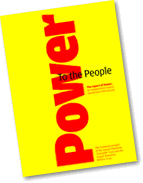
An election is a formal group decision-making process by which a population chooses an individual or multiple individuals to hold public office.

The House of Commons is the lower house of the Parliament of the United Kingdom. Like the upper house, the House of Lords, it meets in the Palace of Westminster in London, England. The House of Commons is an elected body consisting of 650 members known as members of Parliament (MPs). MPs are elected to represent constituencies by the first-past-the-post system and hold their seats until Parliament is dissolved.

The politics of the United Kingdom functions within a constitutional monarchy where executive power is delegated by legislation and social conventions to a unitary parliamentary democracy. From this a hereditary monarch, currently Charles III, serves as head of state while the Prime Minister of the United Kingdom, Rishi Sunak, serves as the elected head of government.

A parliamentary system, or parliamentarian democracy, is a system of democratic governance of a state where the executive derives its democratic legitimacy from its ability to command the support ("confidence") of the legislature, typically a parliament, to which it is accountable. In a parliamentary system, the head of state is usually a person distinct from the head of government. This is in contrast to a presidential system, where the head of state often is also the head of government and, most importantly, where the executive does not derive its democratic legitimacy from the legislature.

The Electoral Reform Society (ERS) is an independent campaigning organisation based in the United Kingdom which promotes electoral reform. It seeks to replace first-past-the-post voting with proportional representation, advocating the single transferable vote. It is the world's oldest operating organisation concerned with political and electoral reform.

In British politics, parliamentary select committees can be appointed from the House of Commons, like the Foreign Affairs Select Committee; from the House of Lords, like the Delegated Powers and Regulatory Reform Committee; or as a joint committee of Parliament drawn from both, such as the Joint Committee on Human Rights. Committees may exist as "sessional" committees – i.e. be near-permanent – or as "ad-hoc" committees with a specific deadline by which to complete their work, after which they cease to exist, such as the Lords Committee on Public Service and Demographic Change.

The Labour Campaign for Electoral Reform (LCER) is an organisation formed of members and supporters of the British Labour Party, who are interested in issues of democratic renewal and electoral reform.

Certain governments in the United Kingdom have, for more than a century, attempted to find a way to reform the House of Lords, the upper house of the Parliament of the United Kingdom. This process was started by the Parliament Act 1911 introduced by the then Liberal Government which stated:
...whereas it is intended to substitute for the House of Lords as it at present exists a Second Chamber constituted on a popular instead of hereditary basis, but such substitution cannot be immediately brought into operation

The Liberal Democrats are a liberal political party in the United Kingdom, founded in 1988. Since the 1992 general election, with the exception of the 2015 general election, they have been the third-largest UK political party by the number of votes cast. They have 14 Members of Parliament in the House of Commons, 83 members of the House of Lords, four Members of the Scottish Parliament and one member in the Welsh Senedd. The party has over 2,500 local council seats. The party holds a twice-per-year Liberal Democrat Conference, at which party policy is formulated. In contrast to its main opponents' conference rules, the Lib Dems grant all members attending its Conference the right to speak in debates and vote on party policy, under a one member, one vote system. The party also allows its members to vote online. The party served as the junior party in a coalition government with the Conservative Party between 2010 and 2015; with Scottish Labour in the Scottish Executive from 1999 to 2007, and with Welsh Labour in the Welsh Government from 2000 to 2003 and from 2016 to 2021.

Liquid democracy is a form of delegative democracy, whereby an electorate engages in collective decision-making through direct participation and dynamic representation. This democratic system utilizes elements of both direct and representative democracy. Voters in a liquid democracy have the right to vote directly on all policy issues à la direct democracy; voters also have the option to delegate their votes to someone who will vote on their behalf à la representative democracy. Any individual may be delegated votes and these proxies may in turn delegate their vote as well as any votes they have been delegated by others resulting in "metadelegation".
Electoral reform is a change in electoral systems which alters how public desires are expressed in election results.

The constitution of the United Kingdom or British constitution comprises the written and unwritten arrangements that establish the United Kingdom of Great Britain and Northern Ireland as a political body. Unlike in most countries, no attempt has been made to codify such arrangements into a single document, thus it is known as an uncodified constitution. This enables the constitution to be easily changed as no provisions are formally entrenched; the Supreme Court of the United Kingdom recognises that there are constitutional principles, including parliamentary sovereignty, the rule of law, democracy, and upholding international law.

There are five types of elections in the United Kingdom: elections to the House of Commons of the United Kingdom, elections to devolved parliaments and assemblies, local elections, mayoral elections, and Police and Crime Commissioner elections. Within each of those categories, there may also be by-elections. Elections are held on Election Day, which is conventionally a Thursday, and under the provisions of the Dissolution and Calling of Parliament Act 2022 the timing of general elections can be held at the discretion of the prime minister during any five-year period. All other types of elections are held after fixed periods, though early elections to the devolved assemblies and parliaments can occur in certain situations. The five electoral systems used are: the single member plurality system (first-past-the-post), the multi-member plurality, the single transferable vote, the additional member system, and the supplementary vote.
Power 2010 was a campaign to reform the Parliament of the United Kingdom.

Take Back Parliament (TBP) was an organisation campaigning for democratic reform in the United Kingdom. The group was formed immediately before the 2010 general election, with funding from the Joseph Rowntree Reform Trust, hoping that there would be opportunities to push for electoral reform after the election. It took a leading role in the 2011 referendum on the Alternative Vote, pushing AV as better than the existing first past the post electoral system and potentially a step towards a proportional representation system. The group no longer exists.

The United Kingdom Alternative Vote referendum, also known as the UK-wide referendum on the Parliamentary voting system was held on Thursday 5 May 2011 in the United Kingdom (UK) to choose the method of electing MPs at subsequent general elections. It occurred as a provision of the Conservative–Liberal Democrat coalition agreement drawn up in 2010 and also indirectly in the aftermath of the 2009 expenses scandal. It operated under the provisions of the Parliamentary Voting System and Constituencies Act 2011 and was the first national referendum to be held under provisions laid out in the Political Parties, Elections and Referendums Act 2000.

The Parliamentary Voting System and Constituencies Act 2011(c. 1) is an Act of the Parliament of the United Kingdom that made provision for the holding of a referendum on whether to introduce the Alternative Vote system in all future general elections to the UK Parliament and also made provision on the number and size of parliamentary constituencies. The Bill for the Act was introduced to the House of Commons on 22 July 2010 and passed third reading on 2 November by 321 votes to 264. The House of Lords passed the Bill, with amendments, on 14 February 2011, and after some compromises between the two Houses on amendments, it received Royal Assent on 16 February 2011.

YES! To Fairer Votes was a political campaign in the United Kingdom whose purpose was to persuade the public to vote in favour of the Alternative Vote (AV) in the referendum on Thursday, 5 May 2011. YES! To Fairer Votes was unsuccessful in changing the voting system, with 32.1% of votes cast in favour. It was opposed by the anti-reform campaign NOtoAV.

A citizens' assembly is a randomly-selected group of people who deliberate on important public questions.

Bite The Ballot (BTB) is a party-neutral movement and registered youth democracy charity, based in the United Kingdom. Its mission is to empower young people to evolve UK democracy.
















